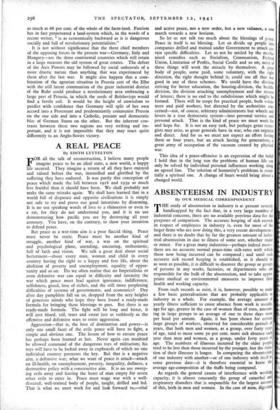A REAL PEACE
By EDITH LYTTELTON
FOR all the talk of reconstruction, I believe many people imagine peace to be an ideal state, a new world, a happy life secured. They imagine a return of all they have enjoyed and valued before the war, intensified and glorified by the suffering they have endured. It was partly this conception of peace which made the lull between 1918 and i939 so much less fruitful than it should have been. We shall probably not make the same mistake again. We shall have learned that in a world full of disparate and opposite civilisations it is simply not safe to try and prove our good intentions by disarming. It is no use speaking words of love to a rhinoceros or even to a rat, for they do not understand you, and it is no use demonstrating how pacific you are by destroying all your armoury. You have, on the contrary, to show your intention to defend peace.
But peace as a war-time aim is a poor flaccid thing. Peace must never be static. Peace must be another kind of struggle, another kind of war, a war on the spiritual and psychological plane, unending, unceasing, enthusiastic, full of faith and vision. We talk a great deal about social betterment—about every man, woman and child in every country having the right to a happy and free life, about the abolition of poverty and unemployment, equality of oppor- tunity and so on. Do we often realise that no Imperialistic or even defensive war can equal in difficulty and intensity the war which peace must lead against ignorance, indifference, selfishness, greed, love of riches, and the still more perplexing difficulties of systems of governments, and economics? Day after day pamphlets fall on us, dropped from the aery heights of generous minds who hope they have found a ready-made formula for bringing these blessings to pass. But there is no ready-made formula. The fight will be long and bitter, it will cost blood, toil, tears and sweat just as ruthlessly as the offensive and defensive wars to resist aggression.
Aggression—that is, the love of domination and power—is only one small facet of the evils peace will have to fight, a simple and obvious one. The lesson of how to ensure peace has perhaps been learned at last. Never again can mankind be allowed command of the dangerous toys of militarism; his toys will have to be locked away in cupboards of which no one individual country possesses the key. Bit that is a negative aim, a defensive war; what we want of peace is attack—attack on ill-health, on unemployment, poverty, inequality, dullness, a destructive policy with a constructive aim. It is no use sweep- ing evils away and leaving the heart of man empty for seven other evils to enter in. Peace must wage war with a well- directed, well-trained body of people, taught, drilled and led. That is what we must work for and look forward to,—vital and active peace, not a new order, but a new valiance, a new march towards a new horizon.
So let us not talk too much about the blessings of peace. Peace in itself is no blessing. Let us divide up people into companies drilled and trained under Government to attack cer- tain specific difficulties. Let us not be misled by the mecha. nised remedies such as Socialism, Communism, Federal Union, Limitation of Profits, Social Credit and so on; none of these things will work the miracle by themselves. A great body of people, some paid, some voluntary, with the right direction, the right thought behind it, could use all that was good in any of these schemes. We could have the division striving for better education, the housing-division, the health. division, the division attacking unemployment and the misuse of leisure; there is no end to the subdivisions which might be formed. There will be scope for practical people, both volue. teers and paid workers, but directed by the authorities con- cerned—not, of course, arbitrary administrators but wheels and levers in a true democratic system—into personal service and personal attack. That is the kind of peace we must work for and hope for. It is not an easy task, but perhaps great strate- gists may arise, as great generals have in war, who can organise and direct. And for us we must not expect an effort lasting three or four years, but an attack lasting for generations, a great army of occupation of the vacuum created by physical war.
This idea of a peace-offensive is an expression of the belief I hold that in the long run the problems of human life can only be solved by individual personal influences working along an agreed line. The solution of humanity's problems is essen- tially a spiritual one. A change of heart would bring about a changed world.


























 Previous page
Previous page